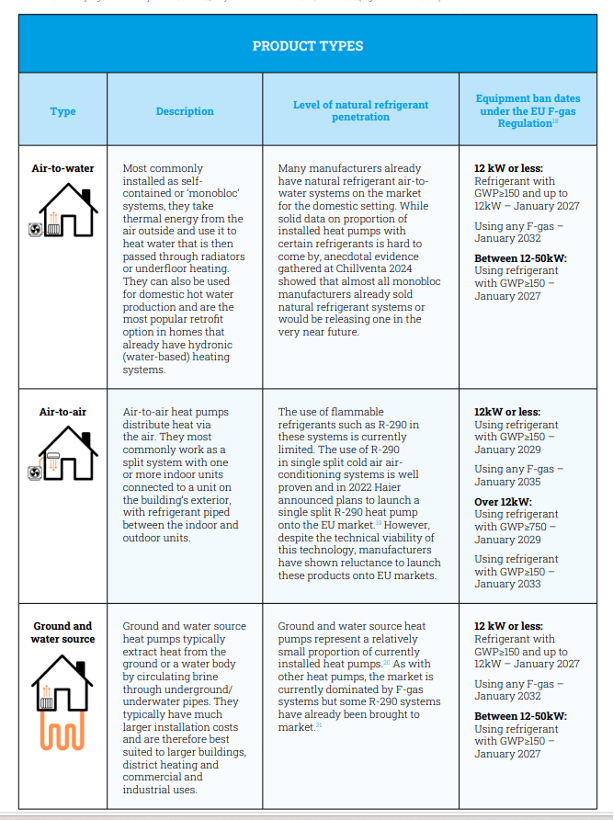1. Promotion of low GWP refrigerants
Cutting emissions from cooling and heating
Emissions from cooling and heating equipment result from both the energy used and also from leaking refrigerant gases. Hydrofluorocarbons (HFCs) are potent greenhouse gases with global warming potentials hundreds to thousands of times greater than carbon dioxide (CO2). They are most commonly used as refrigerants in cooling systems. HFCs leak during use and at end of life contributing to around one third of emissions from cooling equipment, with associated energy use accounting for most of the remaining emissions.
Europe’s F-gas Regulation is driving innovation and cutting emissions
Topten welcomes the revision of the EU’s F-gas Regulation (EU) No 2024/573. In addition to agreeing the world’s first total HFC consumption phase out by 2050, European regulators accelerated consumption reductions to 95% of the baseline by 2030. It is estimated that the phase-out will save around 500 million tonnes of carbon dioxide equivalence.
The graph shows the key new equipment bans affecting heat pumps. Further information on the bans can be found here.

Topten analysis shows a shift to natural refrigerants
Topten analysis of heat pumps shows large and growing availability of energy efficient F-gas free solutions.
In order to support implementation Topten does not include information on air-water heat pumps containing F-gases, as these are soon to become obsolete.
As products move away from HFCs we must ensure that uptake HFOs is avoided. HFOs are a new generation of synthetic fluorinated gases that can generate PFAS or “forever chemicals”—highly persistent substances that pose risks to human health and the environment. PFAS are likely to face further regulatory restrictions at the EU level, thus natural refrigerants are the best alternative.
Policy recommendations aimed at driving installation best in class natural refrigerant heat pumps
- Bonus subsidies for energy efficient natural refrigerant heat pumps will help drive down consumer bills and emissions. These can be funded via the EU’s Social Climate Fund
- Heat pump training schemes should include natural refrigerant handling and provide technicians with information on the restrictions under the F-gas Regulation and the benefits of natural refrigerant systems
- National Green Public Procurement schemes should support use of natural refrigerants in public buildings
Harmonized Safety Standards Across the EU
While there has been an increase of natural refrigerant air-to-water heat pumps arriving on the market, there has been significantly less progress in the roll-out of natural refrigerant air-to-air split systems. These heat pumps are particularly important for uptake in southern European countries and those with a low proportion of existing hydronic heating systems. Heat pump manufacturers identified restrictive safety standards and national building safety regulations as key blockers to their production of these units.
- National authorities should support the updating of standards to allow the safe increase of flammable refrigerant charge sizes. When such changes are adopted, the harmonisation of these standards across Europe should be prioritised
Consumer Transparency and Empowerment
Ensuring consumer transparency and empowerment is essential for promoting sustainable choices.
- Energy labels on heat pumps should prominently display the type of refrigerant used and its GWP, allowing consumers to make informed decisions.
- Certifications should be introduced specifically for products using natural refrigerants, increasing their visibility and credibility in the market.
- Additionally, awareness campaigns should educate the public on the risks associated with PFAS and the environmental benefits of switching to eco-friendly refrigerants.
|
 Kronoterm Adapt MAX10035
Kronoterm Adapt MAX10035 Templari KITA-SP-10, 1Ph
Templari KITA-SP-10, 1Ph Templari KITA-LP-PLUS-35
Templari KITA-LP-PLUS-35 Buderus x-change dynamic pro M
Buderus x-change dynamic pro M Ovum / MHG Heiztechnik Schweiz Ovum AC208P
Ovum / MHG Heiztechnik Schweiz Ovum AC208P